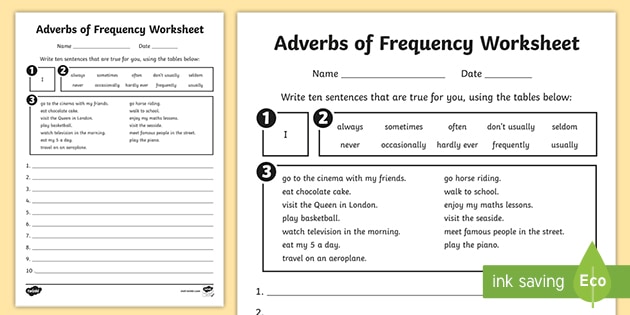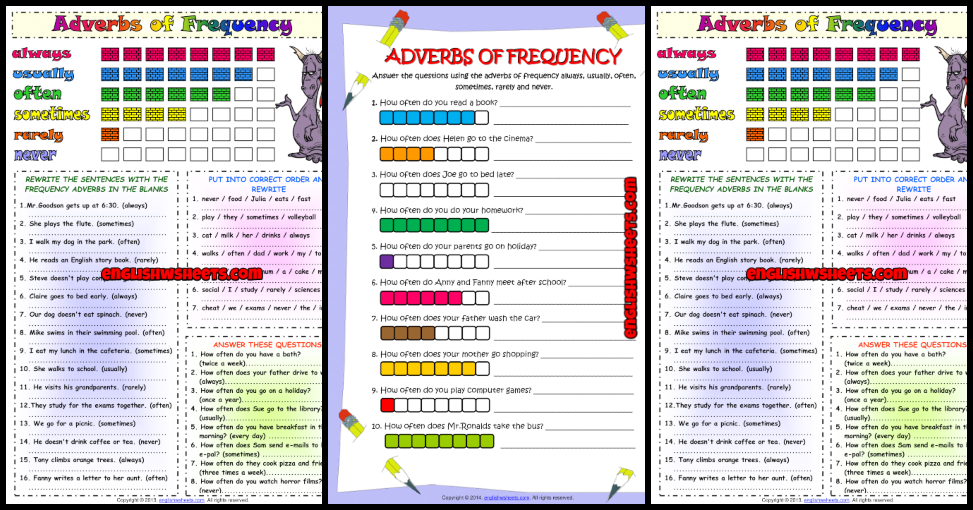
Adverbs of frequency show you how often something happens. Often They read a book.

Often My grandmother goes for a walk in the evening.
Adverbs of frequency activities. Fun Adverbs Of Frequency Activities Alex Case Entertaining speaking activities for always sometimes never etc as well as similar expressions like once every two months and three times a day. Table of Contents. Frequency Adverbs Games and Activities.
Top 20 to Consider. Daily Routines and Adverbs of Frequency. Frequency Adverbs Songs and Chants.
Frequency adverbs - exercises. Adverbs of frequency - 1. Adverbs of frequency - 2.
Adverbs of frequency - 3. Adverbs of frequency - write. Position in sentence 1.
Position in sentence 2. Usually often hardly ever never. Adverbs of frequency - word order.
Position of adverbs of frequency. Position of the adverb of frequency. Always often sometimes never.
Position of adverbs of frequency. ESL Adverbs of Frequency Activity - Reading Listening and Speaking - Elementary A1-A2 - 25 minutes This frequency adverbs activity is ideal for practicing the adverbs of frequency. Always usually sometimes and never.
Divide the students into pairs and give each student a part of the worksheet. Adverb of Frequency - conversations - Fill in the blanks. Adverbs of Frequency - exercise sheet 1.
This board game is great for speaking. Cut the cards and give them to your students for them to explain the words in 1-2 minues without u. Students complete four tasks involving adverbs of frequency.
This is a basic grammar worksheet aimed at revising or introducing. Adverbs of frequency are often used to indicate routine or repeated activities so they are often used with the present simple tense. If a sentence has only one verb place the adverb of frequency in the middle of the sentence so that it is positioned after the subject but before the verb.
He always takes the bus. Adverbs of frequency in English. He listens to the radio.
Often They read a book. Sometimes Pete gets angry. Never Tom is very friendly.
Usually I take sugar in my coffee. Sometimes Ramon and Frank are hungry. Often My grandmother goes for a walk in the evening.
Yes we can use some adverbs of frequency at the beginning or end of a sentence for emphasis. Occasionally I meet her for a coffee. We can use usually often sometimes and occasionally at the beginning of a sentence and sometimes and often at the end.
We use adverb expressions like a lot or not very much after the main verb too. She travels a lot. Where do adverbs of frequency go.
Adverbs of frequency show you how often something happens. This can be always 100 or never 0. The adverb goes next to the verb.
I usually have cereal for breakfast. She sometimes plays football. Use how often to ask a question.
How often do you play computer games. Activity Put in Order. Activity Put in Order.
Play this game to practice word order with adverbs of frequency. Do this interactive activity again. More English activities of the.
Activity Adverbs of Frequency. Classic Find Someone Who activity Whole class activity Activity Notes on Page 2 with Activity Version 1 and Version 2 Level. Are there some things that you do every week.
Do you have a routine. Watch the video and listen to Anne talk about her routine. The focus of this lesson is using adverbs of frequency.
Teaching adverbs of frequency and daily routine A1 ESL EFL Lesson Plan The following lesson plan is suitable for English teachers working with students of A1 beginner English level. The Answer Sheet for the lesson is available for download below. Adverbs of frequency are used to say how often we do things or how often things happen.
Here are some common adverbs of frequency in order from most frequent to least frequent. Always do 100 of the time - eg. She always drinks coffee in the morning.
Always usually often sometimes and never. English as a Second Language ESL Gradelevelelementary. Main contentAdverbs of frequency.
This ESL activity is a fun game to teach adverbs of frequency and expressions such as How often do you exercise. In this game students will be asked questions about how often they do a particular activity. Then they roll the dice to make a silly answer.